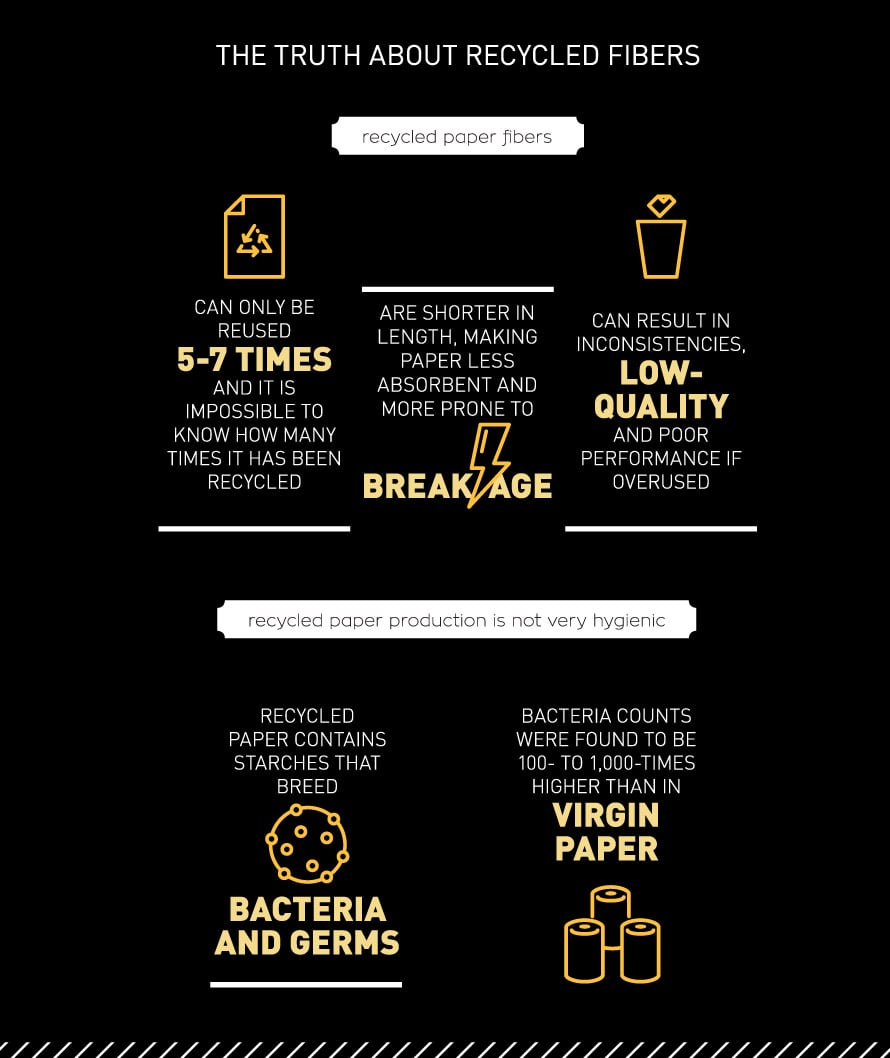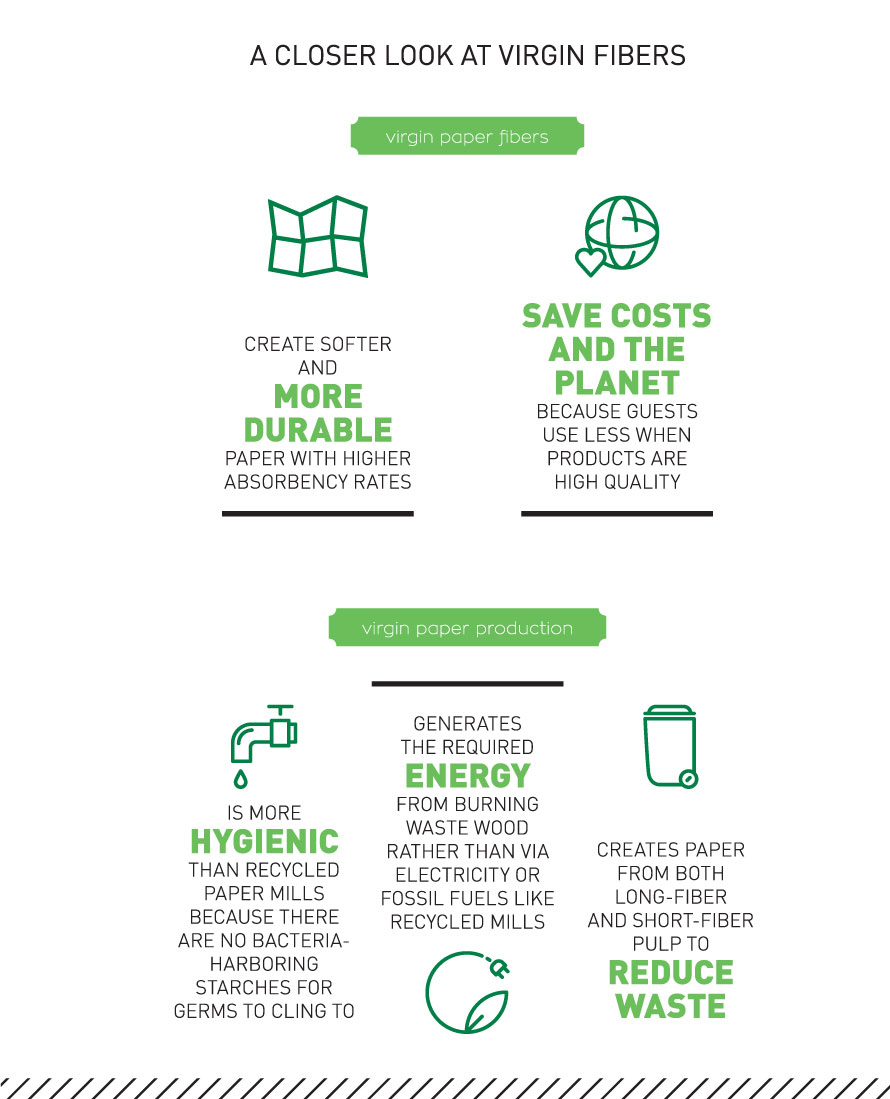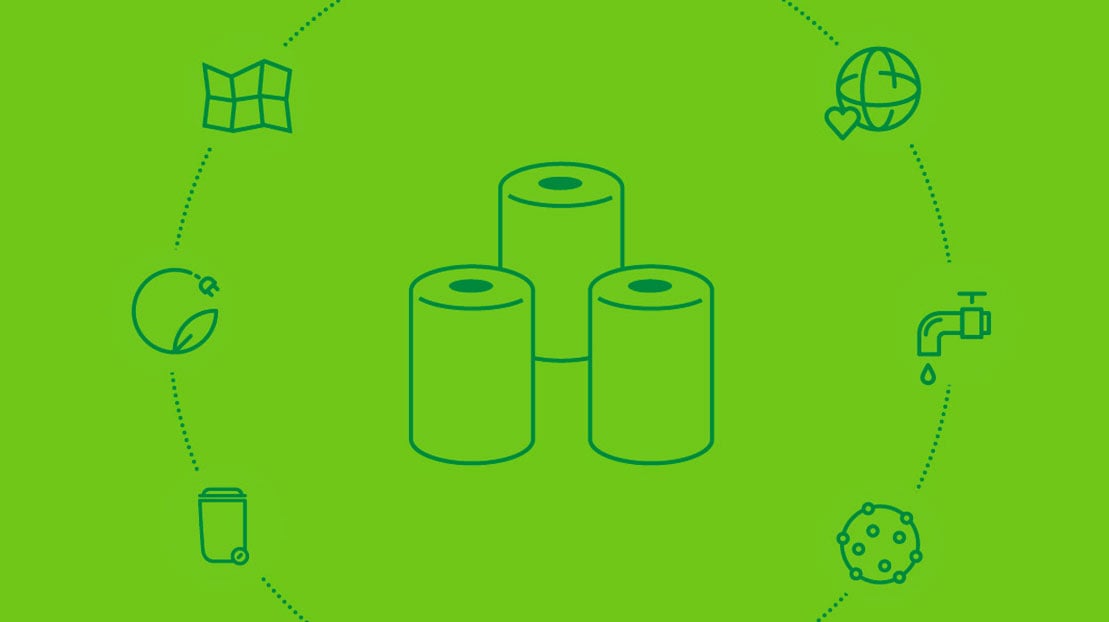Uncovering the Truth: Virgin vs. Recycled Paper
Uncovering the Truth: Virgin vs. Recycled From schools to offices to hospitals to restaurants, paper such as paper towels and toilet tissue is a necessity that keeps organizations functioning properly. And in today’s environmentally conscious world, choosing a sustainable paper option is extremely important. With many companies labeling their products with “recycled,” “green” and “environmentally friendly,” it’s easy to assume those are the best choice. However, there’s more than meets the eye when determining which paper option is right for you and the environment.
While some recycled products are true to their name and goal, many others, especially within the paper industry, can use those words as a branding scheme and not live up to them. Due to the rise in recycled paper products, paper made from virgin fibers is now seen as wasteful. In most cases though, it’s the exact opposite.
Today, many consumers choose to support brands not only because they offer great products and services, but because they are transparent and responsible about labor, safety and sustainability issues. On the other hand, businesses with poor ethics scorecards can quickly drive customers away. This makes a facility manager’s choice in paper an important decision, and one that shouldn’t be based solely on a packaging buzzword.
The Truth about Recycled Fibers
Purchasing products made from recycled paper sounds like the best option to cut waste in restrooms. However, it all comes down to the details. Paper fibers can only be reused from five to seven times1, depending on the paper grade, and it’s impossible to know how many times paper has been reused. Overused paper fibers can result in inconsistencies, low-quality and poor performance, which are sure to create an unpleasant restroom experience.
The paper industry, on average, uses around 40 percent of forestry2. However, trees are a renewable resource and recycling paper reduces the demand for trees, resulting in fewer planted. Recycled fibers are also shorter in length than virgin fibers, which makes the paper more susceptible to breakage and lack absorbency. Recycled paper also doesn’t retain ink as well, causing it to fade or not show up as boldly as intended. Depending on the purpose of the paper, recycled fibers can also cause a lack of stickiness and warp easily under humid conditions.
In addition to basic malfunctions caused by reused fibers, the process of making recycled paper isn’t very hygienic. According to a study done by Laval University, the concentration of bacteria in tested recycled paper was between 100- to 1,000-fold higher than the virgin wood pulp brand3. While the amounts of bacteria found would likely have little effect on healthy people, it does pose a threat to individuals such as young children or those with weakened immune systems. Another study found that recycled paper mills have an issue with bacterial slime4. Since recycled paper contains starches used as binding ingredients, it serves as the perfect breeding ground for bacteria and germs. Some strains found in the study included bacteria associated with food poisoning.
Due to a lack of credible certification, "recycled" paper might not even contain a very high level of original paper, making it necessary for consumers to check percentages. If a brand’s packaging does not identify the paper product as 100 percent recycled, it could have been recovered using energy generated from coal. Because it is contributing to CO2 emissions and using excess energy, recycled paper that does not meet the 100 percent mark means it may as well have not been recycled at all.
1 http://www.nytimes.com/2010/12/21/science/21qna.html
2 http://www.worldwildlife.org/industries/pulp-and-paper
3 http://www.cleanlink.com/news/article/Study-Finds-Bacteria-in-Unused-Paper-Towels--13862
4 https://www.ncbi.nlm.nih.gov/pubmed/20544256

A Closer Look at Virgin Fibers
Paper made from virgin fibers is no less environmentally friendly than paper constructed with recycled fibers – as long as you choose wisely. In fact, the Forest Stewardship Council (FSC) has confirmed that certified virgin paper is environmentally sound . This is in part due to the fact that without the production of virgin fibers, the world would run out of paper within just a few months6. Since recycled paper can only be recycled a certain number of times, virgin paper production is necessary in order to continue using paper products.
The modern production process of virgin fibers is much more hygienic than recycled paper mills and generates the energy needed from burning waste wood rather than relying on electricity or fossil fuels like recycled mills. This method uses virgin pulp bales and processes the material in “pulpers” which enables different types of high-quality paper to be made. For example, long-fiber virgin pulp produces strong kitchen paper, and short-fiber virgin pulp produces soft toilet tissue. There’s no bacteria-harboring starches for germs to cling to or any slime left behind.
Virgin fibers create paper with higher absorbency rates, better ink color and retention, and softer and more durable options. Providing effective and high-quality products reduces waste because guests won’t have to use multiple paper towels or a large portion of the toilet paper roll to satisfy their needs. Better products also contribute to cost savings over time.
Because they are stronger and more reliable, virgin fiber products give customers an enhanced experience. In an age where word-of-mouth can reach millions via social media or review websites, and make or break a brand’s reputation, every business wants to avoid customer disasters, especially in restrooms. Because virgin fiber products also support the environment, they have the opportunity to further improve brand image.
5 http://newsroom.domtar.com/recycled-vs-certified-virgin-paper/
6 http://newsroom.domtar.com/recycled-vs-certified-virgin-paper/

The Sustainable Choice
Through innovative, sustainable strategies and new technology, virgin paper production is an environmentally responsible solution. With forest, water and energy conservation a top concern, virgin paper production must meet certain criteria in order to maintain its designation. Since virgin fibers are created from trees, it’s essential that paper suppliers value natural resources and are open and honest about their production process. To ensure your paper provider is truly sustainable, make sure these non-negotiables are met:
-
Raw material source: Look for the FSC label, which certifies that the paper and raw materials were sourced from sustainably managed forests. It’s also important to find suppliers that condemn illegal tree cutting practices and guarantee that raw materials don’t stem from socially conflicted areas.
-
Manage water use: Look for paper companies that acknowledge water is a precious and valuable element. Suppliers should employ strategies that make sure the correct amount of water is always used to reduce waste.
-
Energy conservation: The paper making process requires a lot of energy, so it’s important to find a supplier that puts thought into how energy sources are employed and works to reduce greenhouse gas emissions.
-
Safety first: Paper products are used every day by millions of people, so safety is a top priority. Suppliers should have safe and sanitary processes in place within their factories to keep workers happy and healthy. Safety innovation also ensures that the end product is strong and reliable and will protect users.
-
High quality: Sustainable paper should also be of high quality so that it is durable during use, expands and absorbs as needed, is soft and breaks down in water so that pipes do not become clogged.
It’s not impossible to identify producers that implement strict procurement policies regarding raw paper materials, use energy and water responsibly and create products that impress customers. More and more suppliers are beginning to adapt to these new demands and in return, help to preserve our planet’s natural resources.
The Truth Revealed
Recycled fibers sound great on paper, but within paper, they’re not as reliable or sustainable as perceived. Whether you require paper products for bathrooms, kitchens or busy office spaces, it’s better to find a sustainable solution that doesn’t result in inconsistencies, potential health hazards or customer satisfaction nightmares. The bottom line is that products made with virgin fibers have the same value in terms of the environment as certified recycled paper, and produce better results.






